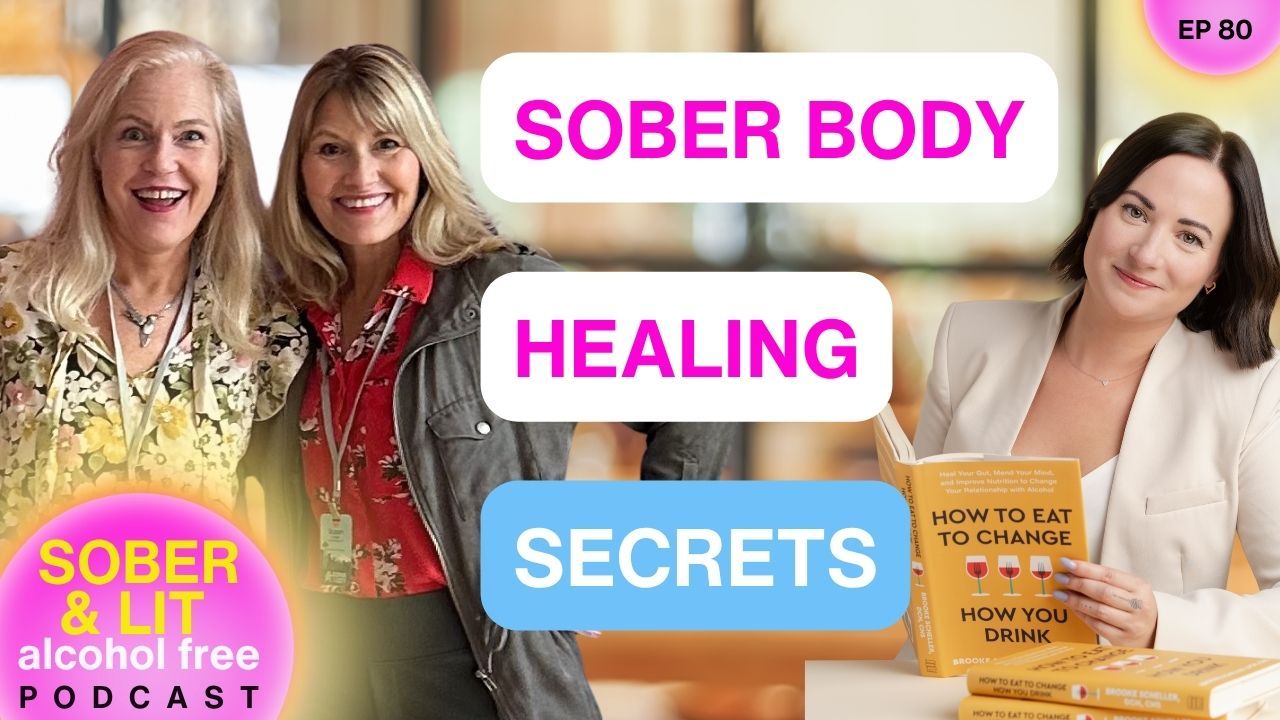Ep. 80 Functional Sobriety: With Dr. Brooke Scheller, Nourishing Your Body for Alcohol-Free Living
Jul 22, 2025
Listen to the PODCAST Here
Watch the Podcast on YouTube Here

Exploring the powerful connection between what we eat, how we heal, and lasting sobriety with Dr. Brooke Scheller
Introduction: A Holistic Approach to Alcohol-Free Living
The decision to become alcohol-free is a monumental first step, but what follows can be just as transformative—especially when it comes to how you support your mind and body after quitting drinking. On a recent episode of the Sober & Lit Podcast, Dr. Brooke Scheller—Doctor of Clinical Nutrition, founder of Functional Sobriety, and author of "How to Eat to Change How You Drink"—shared her expertise on the critical yet often overlooked role of nutrition in alcohol recovery. Her message is clear: Addressing both the physiological and psychological aspects of sobriety is essential for lasting healing.
Dr. Scheller’s Journey: From “Double Life” to Functional Sobriety
Dr. Scheller’s personal story resonates with many: an accomplished health professional by day and a regular drinker by night. Like countless others, she found herself deeply entwined in drinking culture, even among those focused on wellness. The pandemic elevated her drinking habits to a dangerous daily routine, ultimately prompting her to seek help through a 12-step program—a choice that marked the beginning of her alcohol-free life in 2021.
The big revelation arrived quickly: Living without alcohol drastically improved her mental clarity, emotional stability, and even career trajectory. Sobriety became both her personal and professional mission, culminating in her pioneering work around nutrition and functional medicine for people seeking freedom from alcohol.
Nutrition: The Missing Piece in Alcohol Recovery
Conversations about alcohol recovery often revolve around mental health and trauma. While these are crucial, Dr. Scheller emphasizes that nutritional physiology accounts for half the equation. Alcohol disrupts bodily processes and depletes key nutrients, causing fatigue, mood swings, poor concentration, digestive woes, and more. When alcohol is removed, the body is suddenly faced with repairing these deficits.
Dr. Scheller advocates for strategic food choices and targeted supplementation to facilitate healing and reduce cravings. She argues that when people don’t feel “better” after quitting alcohol, it’s often a sign that their physical body needs additional support.
What to Eat in Early Sobriety: Small Changes, Big Impact
A recurring theme in Dr. Scheller’s advice is simplicity: Profound change doesn’t require drastic diets. Instead, start with making meals more regular and balanced. Consistent eating–every three to four hours–stabilizes blood sugar, which in turn reduces those familiar irritability-driven cravings that can send someone reaching for a drink.
Protein, protein, protein. Including a protein source at every meal and snack isn’t just about feeling full—it supports balanced blood sugar and more even moods. Dr. Scheller also points out that alcohol often wreaks havoc on hunger and satiety hormones, with some people overeating and others drastically undereating in active addiction. Rebuilding a healthy relationship with food helps recalibrate these internal signals.
Foundational Supplements for Repair and Resilience
Alcohol’s toll on the body extends to deep nutrient depletion. According to Dr. Scheller, there are a few evidence-backed supplements that can be especially helpful in early sobriety:
- B-Complex Vitamins: Crucial for energy production and mood support.
- Vitamin D: Frequently deficient and linked to mood regulation—get your levels checked.
- Omega-3s (Fish Oil): Promotes brain health and may reduce cravings.
- Magnesium Glycinate: Supports relaxation and sleep—common struggles for those newly sober.
- Amino Acids (like L-glutamine, L-theanine): Can help ease cravings and fuel neurotransmitter balance.
Dr. Scheller notes the importance of individual testing and consulting professionals to tailor supplementation for your specific needs.
Gut Health: The Foundation of Healing
Alcohol is notoriously damaging to digestive health. It disrupts the microbiome, inflames the gut lining, impairs nutrient absorption, and is often a root cause of issues like IBS, reflux, and constipation. Dr. Scheller recommends increasing fiber—especially from fruits and vegetables—and considering probiotics or digestive enzymes as first steps toward restoring gut health. Healing the gut can be a months- to year-long journey, but the benefits reverberate through every system, including the brain.
Conclusion: Beyond Quitting, Toward Thriving
Dr. Scheller’s message goes beyond simply quitting alcohol: true transformation comes from resourcing your body and mind to thrive. Addressing nutritional deficiencies, stabilizing blood sugar, and repairing the gut lay the groundwork for a joyful, sustainable alcohol-free life. Her holistic, functional approach empowers people not just to “get stopped,” but to *stay* stopped—unlocking the full potential of sobriety.
*For more practical guidance, including recipes and supplement protocols, check out Dr. Brooke Scheller’s book, "How to Eat to Change How You Drink."
Listeners have said that our podcast has helped them get alcohol free! So we created Feel Lit 21, a way for you to press your reset button and take a 21 day break from alcohol. Every day you will receive emails with videos, journal prompts, and the inspiration you need to embrace 21 days without alcohol that feels lit!
https://feellitpodcast.com/FeelLit21-sg
Find community and connection on the Feel Lit Alcohol Free Facebook Page: https://www.facebook.com/groups/feellitalcoholfreepodcast
Ruby Williams at Freedom Renegade Coaching https://www.freedomrenegadecoaching.com/
Follow Coach Ruby: @rubywilliamscoaching
Email: [email protected]
